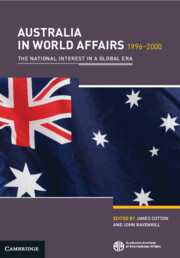Book contents
- Frontmatter
- Contents
- Figure
- Contributors
- Preface
- Abbreviations
- Part I Setting the Scene
- Part II Relationships
- Part III Issues
- 11 Facing an Uncertain Future: Defence and Security under the Howard Government
- 12 The East Timor Commitment and Its Consequences
- 13 Australia in World Environmental Affairs
- 14 Australia and the International Human Rights Regime1
- 15 Australia and the Global Economy
- 16 Australia and the Asian Economic Crisis
- References
- Index
14 - Australia and the International Human Rights Regime1
from Part III - Issues
Published online by Cambridge University Press: 04 May 2024
- Frontmatter
- Contents
- Figure
- Contributors
- Preface
- Abbreviations
- Part I Setting the Scene
- Part II Relationships
- Part III Issues
- 11 Facing an Uncertain Future: Defence and Security under the Howard Government
- 12 The East Timor Commitment and Its Consequences
- 13 Australia in World Environmental Affairs
- 14 Australia and the International Human Rights Regime1
- 15 Australia and the Global Economy
- 16 Australia and the Asian Economic Crisis
- References
- Index
Summary
By any criterion, Australia’s international human rights policy between 1996 and 2000 was fraught with contradiction. On the one hand, the Coalition government reversed decades of myopia by actively supporting self-determination for the people of East Timor, and was commended by the UN Secretary-General as a leading facilitator of the UN’s new regional strategy for enforcing the principle of humanitarian intervention. On the other hand, it adopted a regressive stance towards the traditional emphases of post-1972 Australian human rights policy by rejecting multilateralism, bipartisanship, self-criticism, and the right of UN human rights bodies to monitor Australia’s human rights conditions. Critical to this regressive mood was the government’s inability to become reconciled with the indigenous population and to respond to its demands for a national apology to the Stolen Generations of Aboriginal children.
Keywords
- Type
- Chapter
- Information
- Australia in World Affairs 1996–2000The National Interest in a Global Era, pp. 178 - 192Publisher: Cambridge University PressFirst published in: 2024

